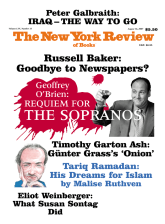In response to:
Plain Tales from British India from the April 26, 2007 issue
To the Editors:
William Dalrymple’s review of recent books on the British Empire [“Plain Tales from British India,” NYR, April 26] finds fault with my book, The Scandal of Empire, for not being about either how Indians viewed the British or how closely connected Indians and Britons were in the eighteenth century. While I have written a great deal elsewhere about these questions (based on decades of work with Indian-language sources), my new book is not about them. It is, instead, about the scandal of empire for the British themselves. Dalrymple dismisses this by noting that “empire was in the eighteenth century regarded as one of the facts of life.” He ignores the fact that the most significant of all parliamentary inquiries into corruption in late-eighteenth-century Britain concerned precisely the growth of their empire in India.
Edmund Burke, the protagonist of the impeachment trial of Warren Hastings, was deeply exercised about the empire (and he was not alone). Burke worried that the excesses of the East India Company traders and the drain of wealth from India would both ruin the subcontinent and undermine the authority and reputation of the ancient constitution of England. The Scandal of Empire is an extended analysis of the crises around corruption, sovereignty, trade, government, and even history that imperial activity in India occasioned. The central figure of the book is Edmund Burke himself.
Dalrymple is not wrong, however, to note the polarized nature of the field of imperial history nowadays. He reacts almost viscerally to the charge that empire itself is a historical problem. While there is nothing “Anglophobic” about a book that is as critical of US policy in Iraq today as it is of British corruption in India in the eighteenth century, I do lament that much contemporary writing about imperial history continues to traffic in old imperial assumptions, among them the one that England conquered India “in a fit of absence of mind.” There was nothing absent-minded about the relentless imperative to conquer lands and peoples in the name of free trade and global security, then or now. But at least then there was a figure like Burke who, despite his own complicated views on Britain and India, spent the last ten years of his life prosecuting imperial injustice.
Nicholas B. Dirks
Franz Boas Professor of History and Anthropology
Columbia University
New York City
William Dalrymple replies:
Nicholas Dirks seems to have misunderstood my problems with his book. It was not that I have any objection to criticizing empire per se, still less that I object to censuring the East India Company: after all, my own Last Mughal is itself an exposé of the aggressive and rapacious brutality of the company.
My principal objection was that Dirks, while claiming to break radical new ground, and roundly criticizing the work of those historians of the company who have gone before him—notably the painstaking research of the great authority on Hastings, Peter Marshall—seems to have accessed surprisingly few primary sources in the course of his research, and certainly no primary source in any Indian language. Judging by his footnotes, he does not even seem to have spent much time with the easily accessible private papers of Edmund Burke and Warren Hastings, the two principals in his study. Instead, the references point toward research based largely on secondary published material, with an emphasis on the theoretical work of Dirks’s academic friends and colleagues in postcolonial studies.
Partly as a result of this, Dirks has failed to appreciate the degree to which Burke’s assault on Warren Hastings was based on misinformation fed to him by Hastings’s rapacious enemy, Philip Francis, who was determined for personal reasons of revenge to ruin the former governor general. After all, Burke had never visited India, and like Dirks, relied mostly on secondary sources. Nor does Dirks seem to grasp how Burke misjudged the nature of Hastings’s administration in India, and the fact that Hastings had energetically begun the process of regulating and reforming the company.
As I wrote in the review, Dirks “relies principally on the evidence of Burke, who was notably ill-informed about India, and who like Dirks—and unlike Hastings—had none of the relevant North Indian languages.” The result is a book that is doubly grounded in polemic, rather than new research, and whose Manichaean worldview is as a result simplistic and reductionist. In addition to this, Dirks’s book is, as I wrote, peppered throughout with major factual errors, further undermining its credibility.
This Issue
August 16, 2007



